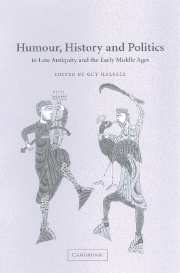Book contents
- Frontmatter
- Contents
- Notes on contributors
- Preface
- List of abbreviations
- Introduction: ‘Don't worry, I've got the key’
- PART I THE FATE OF HUMOROUS WRITING
- PART II HUMOUR AND THE POLITICS OF DIFFERENCE
- PART III HUMOUR, HISTORY AND POLITICS IN THE CAROLINGIAN WORLD
- 6 ‘He never even allowed his white teeth to be bared in laughter’: the politics of humour in the Carolingian renaissance
- 7 Alcuin's Disputatio Pippini and the early medieval riddle tradition
- 8 Laughter after Babel's fall: misunderstanding and miscommunication in the ninth-century west
- Index
7 - Alcuin's Disputatio Pippini and the early medieval riddle tradition
Published online by Cambridge University Press: 24 July 2009
- Frontmatter
- Contents
- Notes on contributors
- Preface
- List of abbreviations
- Introduction: ‘Don't worry, I've got the key’
- PART I THE FATE OF HUMOROUS WRITING
- PART II HUMOUR AND THE POLITICS OF DIFFERENCE
- PART III HUMOUR, HISTORY AND POLITICS IN THE CAROLINGIAN WORLD
- 6 ‘He never even allowed his white teeth to be bared in laughter’: the politics of humour in the Carolingian renaissance
- 7 Alcuin's Disputatio Pippini and the early medieval riddle tradition
- 8 Laughter after Babel's fall: misunderstanding and miscommunication in the ninth-century west
- Index
Summary
The early medieval period saw a flowering of riddles and riddle collections, both religious and secular, both earnest and light-hearted. To date the greater part of scholarly attention has been focussed on the Old English riddles of the Exeter Book, on the grounds both of literary merit and of mystery – the text does not include the answers, an omission that has provided happy occupation for decades of scholars. These two features – literary merit and mystery – also appear in what is perhaps a yet more remarkable riddle collection, the Disputatio regalis et nobilissimi iuvenis Pippini cum Albino scholastico of Alcuin. The Disputatio is unusual in that it intermingles prose riddles with wisdom literature; that, unlike all other examples of the form, it puts the dialogue in the mouths of contemporary interlocutors (one Alcuin, the other Pippin, the son of Charlemagne), and represents itself as conversation between them; and that, to a degree rarely seen in dialogues, it is playful, teasing and genuinely witty. For the most part, however, scholarship has ignored the Disputatio, and the text has yet to claim its rightful place as a remarkable reflection of the strength a dialogue could obtain in the hands of a master craftsman such as Alcuin.
The early medieval tradition of literary riddling was inspired by Symphosius (or Symposius), a Late Latin poet whose exact identity is uncertain.
- Type
- Chapter
- Information
- Publisher: Cambridge University PressPrint publication year: 2002
- 1
- Cited by



